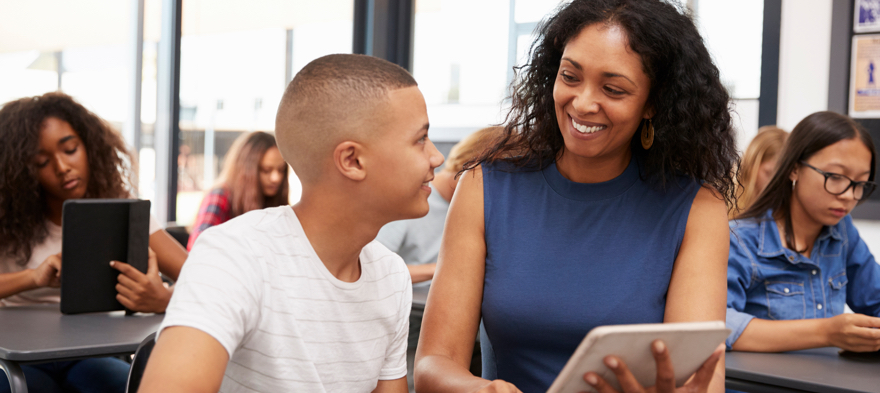
Oct 1, 2019 12:00:00 AM
by Kelisa Wing
School discipline will always be a hotly debated topic. As an advocate, I have argued for more proactive, inclusionary practices that address prevention rather than reaction, but I realize that the ability to have positive behavior in the classroom is how we can ensure that students are receiving a high-quality education.
It is not lost on me that educators today are dealing with disrespectful behaviors from the very students they are attempting to educate. But [pullquote]I want to challenge us all to look inward when thinking about disciplinary practices in our schools.[/pullquote]
Last week, I attended my daughter’s back to school night. I observed one teacher talk about how students were talking and not doing work, and how we could help her as parents. But I also noticed that she often gives students worksheets or assignments where they are copying notes from the board.
I looked at her syllabus and her grading practices were not set up in a way that communicated belief in her students. She had nothing around her room that showed her philosophy or love of teaching. The entire environment was not set up for students to be successful. Is it any wonder why students were not behaving to her liking?
[pullquote position="right"]From the moment a child steps into our classrooms, they should feel welcome from our classroom climate and culture that we establish.[/pullquote]
Just down the hallway, my daughter’s Science teacher explained the rigorous student-centered learning that students would be engaged in during the school year. He was not experiencing the behavior that the other teacher was facing. He related to students at their level. He knew what words to use to spark their interest—and I noticed he was being culturally relevant, while still giving students access to the eighth grade standards. The same students from the same neighborhoods were giving a much different response to this educator because they were engaged.
[pullquote]While we like to lay blame at the feet of many others about the perils of education, we have to remember that it starts with us[/pullquote]—the success or failure of students is in our hands. How we choose to discipline them is on us. We also have to remember that engaged students are less likely to get into trouble than those who are not.
It starts with us.
While we may want to sit around and talk about school discipline, lack of parent involvement, home environment and the like, the real conversation we need to have is about pedagogy, classroom management and student engagement. We set the boundaries for what we will and will not tolerate in our classrooms.
It starts with us.
Discipline is defined as “training someone to do what we want them to do through punishment.” However, our role is to educate, to teach and to transfer knowledge. [pullquote position="right"]We must become a warm demander for our students’ behavior and education.[/pullquote]
We must study warm demander pedagogy if we want to take back control of our ability to ensure that learning is at the center of our classrooms. We have to stop asking our students to perform and we must demand that they learn, achieve and succeed in a dynamic world in a warm and loving way. “Will you please open your book?” elicits a much different response than, “Open your book, thank you.”
We need to be concerned about discipline, but we also need to examine ourselves and ask,
This is the real conversation we need to have, but it must start with us.
Kelisa Wing is the author of "Weeds & Seeds: How To Stay Positive in the Midst of Life’s Storms" and "Promises and Possibilities: Dismantling the School to Prison Pipeline" (both available on Amazon). She also is a 2017 State Teacher of the year, speaker, teacher and activist for discipline reform. Kelisa holds a bachelor’s degree in English from the University of Maryland University College, a master of arts in secondary education and an educational specialist degree with a concentration in curriculum, instruction and educational leadership from the University of Phoenix. She is currently enrolled at Walden University in the doctor of education program. All views expressed are her own and do not reflect the views of any others.
The story you tell yourself about your own math ability tends to become true. This isn’t some Oprah aphorism about attracting what you want from the universe. Well, I guess it kind of is, but...
If you have a child with disabilities, you’re not alone: According to the latest data, over 7 million American schoolchildren — 14% of all students ages 3-21 — are classified as eligible for special...
The fight for educational equity has never been just about schools. The real North Star for this work is providing opportunities for each child to thrive into adulthood. This means that our advocacy...
Your donations support the voices who challenge decision makers to provide the learning opportunities all children need to thrive.
Ed Post is the flagship website platform of brightbeam, a 501(c3) network of education activists and influencers demanding a better education and a brighter future for every child.
© 2020–2024 brightbeam. All rights reserved.
Leave a Comment